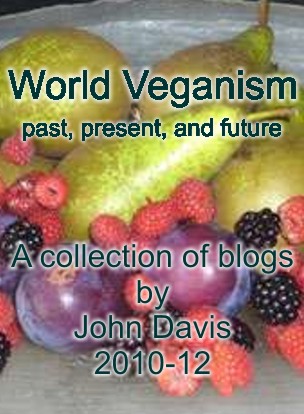May 11, 2011
After a couple of months of lively, and even heated, debate about the meaning of the word 'vegetarian' the IVU International Council finally reached a unanimous proposal. The Council currently consists of 16 voting members from Argentina, Australia, Brazil, India, Indonesia, Nigeria, Singapore, Togo, Spain, United Arab Emirates, UK and USA.
This proposal was then put to all the member organizations by email ballot (IVU does not have individual members, but the large number of member orgs have hundreds of thousands of individual members and supporters). The response was an overwhelming -94% - 'yes'.
 Those that voted are from all the above countries plus: Bangladesh, Belgium, Botswana, Costa Rica, Czech Republic, France, Germany, Israel, Italy, New Zealand, Paraguay, Portugal, Thailand and Turkey.
Those that voted are from all the above countries plus: Bangladesh, Belgium, Botswana, Costa Rica, Czech Republic, France, Germany, Israel, Italy, New Zealand, Paraguay, Portugal, Thailand and Turkey.
Some countries have more than one member organization, such as the UK and USA which have many in each - and all entitled to vote. Right: a small sample of IVU member logos:
This is the message that George Jacobs, Chair of the IVU Council (in Singapore) sent to all the members:
By way of background, the IVU International Council (IC) consists of members elected every two years by you, the member organisations, and regional coordinators who liaise with member organisations in a particular part of the world. I am an elected member of IC, and in 2008, I was selected by IC to serve as chair of IC.
Recently, IC voted to bring a new definition of "vegetarian' to you, the member organisations, for approval. The current definition, as used in our Memorandum of Association - www.ivu.org/..articles.html - states:
"For the purpose of membership of IVU, vegetarianism includes veganism and is defined as the practice of not eating meat, poultry or fish or their by-products, with or without the use of dairy products or eggs."
IC suggests that we change the definition to the following:
"IVU defines vegetarianism as a diet of foods derived from plants, with or without eggs, dairy products, and/or honey."
The two definitions seem quite similar. The main reason we are proposing this change is that the proposed definition highlights diets derived from plants, while at the same time including those vegetarians who also eat non-flesh animal based foods, such as dairy and eggs. Our goal is to maintain the crucial unity of all vegetarians while acknowledging the benefits of plant based diets for human health, the environment and our fellow animals.
In the past, the situation with our food was different in two ways. One difference is that factory farming has now spread its tentacles further and intensified the conditions under which increasing numbers of our fellow animals suffer.
Another difference between the situation today and that of the past lies in the greater amount of knowledge we have:
- We now understand more about the health dangers of foods from animals;
- we know more about the connection between livestock raising and climate change;
- awareness has grown substantially as to the horrors of intensive farming, of not just meat but also of eggs, dairy and honey.
As a result of these differences in knowledge, we can see a huge increase in the number of people who know about plant based diets and a smaller increase in the number of people who are adopting them. Yes, as a percentage of the entire population, those who eat a vegan diet constitute a very small percentage of the population, but it is a growing percentage in some countries, and whereas even five years ago, "vegan' was a word and a concept most people in most places didn't know, today at least people are aware that some among them choose plant based diets and that there exists a sensible rationale for choosing not to eat any animal based products.
A second reason we like the new definition is that this definition uses positive wording. The current definition uses negative wording, as it talks about what vegetarians do not eat: "not eating meat, poultry or fish or their by-products". In contrast, the new definition is positively worded: "a diet of foods derived from plants". We hope that the positive wording will put vegetarianism in an optimistic, constructive light.
The discussions
Many issues arose in the discussions and it was clear that there were views from opposite directions on several points. The new definition is inevitably a compromise which the ballot showed is an acceptable minimum basis for most of the IVU member organisations. It is not in any way binding on the member organisations, which will continue to use their own definitions, or adapt this one, as they wish.
From the discussions we know that:
Some will just delete everything after the first comma.
Some will move dairy products into the section before the comma.
Some will add another clause defining what they do not eat.
Some will produce extremely detailed lists of everything they do or do not eat.
Some will include their particular priorities of why they choose this diet.
The old definition was in place for almost 12 years, and no doubt this issue will continue to be debated and the definition is likely to be further revised one day in the distant future. Some of the points raised:
Eggs/dairy/honey are not veg - true, so delete the 2nd half for your own purposes if you prefer...
Mushrooms and seaweed are not plants - in recent years biologists have deemed that fungi and algae do not belong in the kingdom of plantae. But for most of us common folk a plant is something that grows in the ground, or the sea, and cannot more around of its own accord - sounds like a mushroom... we'll stay with common usage.
Salt is not a plant - true, but added salt is not food either, it's little more than an addiction with people in developed countries consuming, on average, ten times more salt than they need. Plant foods contain enough natural sodium for normal needs. Some medical conditions require added salt, but then it is, in effect, a medicine/drug, not food. The meaning of this definition is perfectly obvious - and quite sufficient for us to decide who can or cannot join IVU, which was the original reason for doing this.
 John Davis
John Davis
